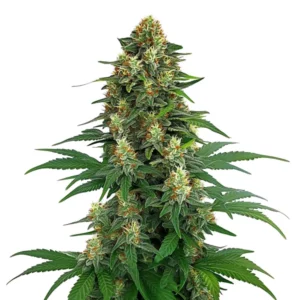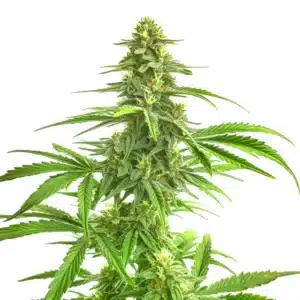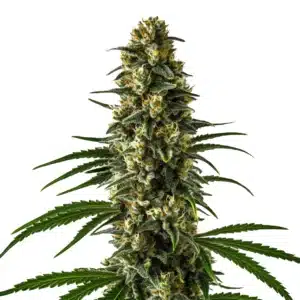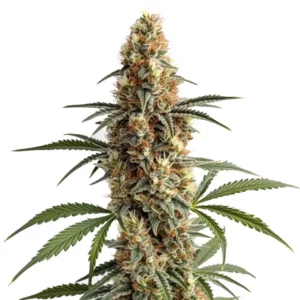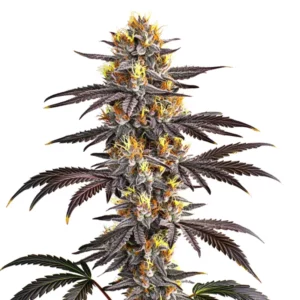
What is the metabolic pathway of cannabis?
Cannabis, known for its unique properties, undergoes a complex metabolic pathway in the body. What is the metabolic pathway of cannabis? Whether you’re a first-time cannabis seed buyer or an experienced grower, comprehending this pathway can provide valuable insights into the plant’s effects.
The process of cannabis refers to the way the body breaks down and utilizes the active compounds in cannabis, known as cannabinoids. The most well-known cannabinoids are THC (Tetrahydrocannabinol) and CBD (Cannabidiol), each offering different effects.
Knowing how cannabis is processed can assist you in selecting the right strains for your needs. For instance, if you’re seeking a strain with a high THC content, you might opt for the Wombat strain from Blimburn Seeds. This strain is known for its high THC levels, offering a potent psychoactive effect.
Comprehending cannabis also involves familiarizing oneself with the different cannabinoids and their respective properties. Each cannabinoid carries unique characteristics that affect the body in different ways, influencing the overall cannabis experience. This knowledge can be particularly useful for medical cannabis users seeking specific therapeutic effects.
Biological breakdown of cannabinoids in the body
When cannabis is consumed, the cannabinoids are absorbed into the bloodstream. The body then begins the process of metabolizing these compounds, with the liver playing a key role. This organ contains enzymes that break down THC and CBD into metabolites.
One of these metabolites, 11-OH-THC, is actually more potent than THC itself. This explains why edibles, which allow THC to be fully metabolized in the liver, can produce stronger effects than smoking or vaping cannabis.
Comprehending the biological breakdown of cannabinoids in the body is important, as it helps to explain why the effects of cannabis can vary so much. Consumption methods, dosage, and even individual metabolic rates can all play a role in this process. For example, cannabinoids consumed through edibles have to pass through the digestive system before reaching the liver, which can delay the onset of effects and potentially enhance their intensity.
Furthermore, research has shown that the metabolism of cannabinoids can also be influenced by genetic factors. Certain genetic variations can affect the function of the enzymes responsible for metabolizing cannabinoids, leading to variations in the way individuals experience the effects of cannabis. This underscores the complexity of the metabolic pathway of cannabis and the need for further research in this area.
Promos & Deals
THC Metabolism in the Human Body: What is the Metabolic Pathway of Cannabis?
THC metabolism is a multi-step process. Initially, THC is converted into 11-OH-THC, a powerful psychoactive compound. This is then metabolized further into THC-COOH, which is non-psychoactive but can be detected in drug tests.
The rate at which THC is metabolized can vary greatly from person to person, depending on factors such as body mass, metabolism speed, and frequency of cannabis use. This variability can make it difficult to predict the duration and intensity of cannabis’ effects.
As the main psychoactive compound in cannabis, comprehending THC metabolism in the human body is key to appreciating the full effect of cannabis use. The duration and intensity of THC’s effects can be influenced by factors such as the method of consumption and individual biological factors. For example, THC metabolism can be slower in individuals with less active liver enzymes, leading to prolonged and potentially more intense effects.
Moreover, the complexity of THC metabolism in the human body serves as a testament to the intricate relationship between cannabis and the human endocannabinoid system. What is the metabolic pathway of cannabis? This system, which plays a key role in regulating various physiological processes, interacts closely with cannabinoids like THC, influencing how they’re metabolized and ultimately how they affect the body.
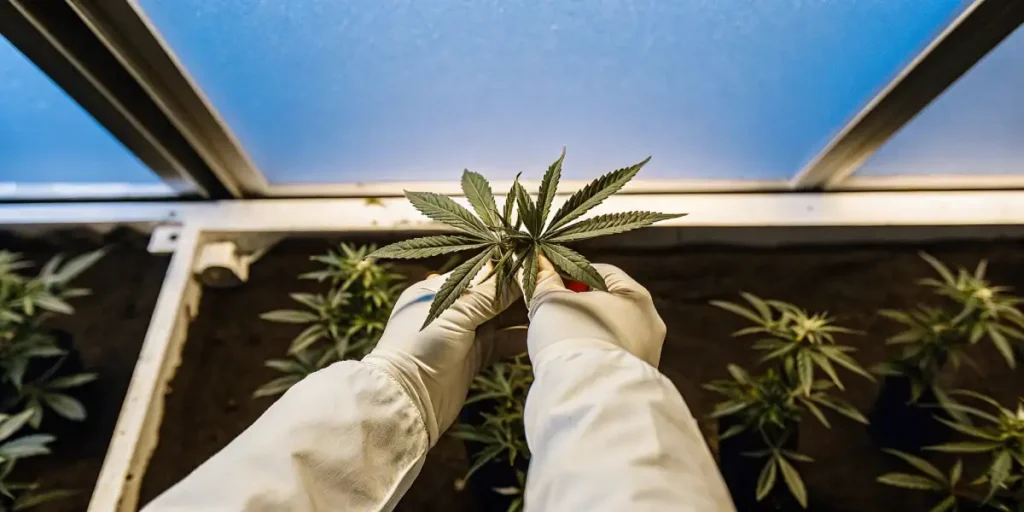
How does the body metabolize cannabis?
After consumption, cannabis is metabolized primarily by the liver. The cannabinoids are broken down into different metabolites, each with their own effects on the body. Some of these metabolites can remain in the body for several weeks, particularly in regular cannabis users.
If you’re looking for a strain that’s easy to grow and offers a balanced mix of THC and CBD, consider the Girl Scout Cookies strain from Blimburn Seeds. This strain is highly regarded for its balanced cannabinoid profile, making it a popular choice among both recreational and medicinal users.
Comprehending how the body metabolizes cannabis is crucial to optimizing your cannabis experience. Being aware of factors that can influence this process, such as your metabolism speed, body mass, and frequency of use, can help you better predict and control the effects of cannabis. Moreover, this knowledge can be useful in managing potential side effects and avoiding overconsumption.
The metabolic pathway of cannabis is not only important for individual users, but it also has significant implications for the medical community and law enforcement agencies. For medical professionals, comprehending how the body metabolizes cannabis can guide dosing recommendations and treatment plans for patients using medicinal cannabis. Meanwhile, for law enforcement, this knowledge can assist in interpreting drug test results and determining recent cannabis usage.

FAQs
What are the effects of cannabis on metabolic processes, and what is the metabolic pathway of cannabis?
The effects of cannabis on metabolic processes can vary depending on the specific cannabinoids present. THC, for instance, is known to stimulate appetite, which can affect metabolic rate. On the other hand, CBD may have anti-inflammatory properties, and some research suggests it may help regulate blood sugar levels.
Some people may experience a change in metabolic rate as a result of using cannabis, which can lead to changes in weight. However, this effect can vary widely from person to person, and more research is needed to fully understand these effects.
When considering the effects of cannabis on metabolic processes, it’s important to note that the plant’s influence extends beyond the digestive system. Cannabis also interacts with the endocannabinoid system, impacting various physiological processes such as mood, memory, and pain sensation. Therefore, the effects of cannabis are multifaceted and involve several metabolic processes.
Additionally, the effects of cannabis on metabolic processes can be influenced by factors such as the method of consumption, the strain of cannabis used, and individual biological factors. For instance, smoking cannabis may result in faster metabolism of THC compared to consuming edibles, leading to different effects and durations of action. Knowing what the metabolic pathway of cannabis is can provide further insight into how these factors impact its effects on the body.
How does the metabolic pathway of cannabis affect its effects?
How the body metabolizes cannabis can greatly influence its effects. For example, when cannabis is consumed orally, it’s metabolized by the liver before entering the bloodstream. This results in a more potent psychoactive effect compared to inhaled cannabis, as THC is converted into the more powerful 11-OH-THC.
This difference in metabolism can also affect the duration of cannabis’ effects. Inhaled cannabis typically produces effects within minutes, which peak after about 30 minutes and taper off within a couple of hours. On the other hand, the effects of orally consumed cannabis can take up to two hours to be felt and can last for several hours.
Aside from the method of consumption, other factors can significantly influence the metabolic pathway of cannabis and consequently, its effects. These include the individual’s body composition, tolerance levels, and the presence of other substances such as alcohol or medications. For example, alcohol can inhibit the metabolism of THC, leading to stronger and more prolonged effects.
Furthermore, the process of cannabis metabolism can also influence the risk of developing side effects or experiencing a ‘bad trip’. Comprehending this process can therefore help individuals make informed decisions about cannabis use and minimize potential risks. For instance, knowing that edible cannabis products can produce stronger and longer-lasting effects than inhaled cannabis may encourage users to start with lower doses and wait longer between doses.
What factors can influence the metabolic pathway of cannabis?
Several factors can influence the metabolic pathway of cannabis. These include the method of consumption, the individual’s metabolism, and the frequency of use. For example, people who use cannabis regularly may metabolize it more quickly due to increased tolerance.
For experienced growers interested in a strain that offers a high yield and a quick flowering time, the Zombie Death Fuck strain from Blimburn Seeds is a fantastic option. This strain is known for its high THC content and the intense effects it produces, making it a favorite among many cannabis enthusiasts.
Aside from the factors mentioned, genetic predispositions also play a significant role in influencing the metabolism of cannabis. Certain genetic variations can affect the function of the enzymes responsible for metabolizing THC and CBD, leading to variations in the way individuals experience the effects of cannabis. This is why cannabis use can result in vastly different effects among different individuals, even when the same strain and consumption method are used.
Additionally, environmental factors such as diet and lifestyle can also influence the metabolism of cannabis. For example, research suggests that a diet high in fat can increase the absorption of cannabinoids, while regular exercise can potentially speed up the metabolization of THC. Recognizing these factors can help individuals tailor their cannabis use to their own unique metabolic processes, enhancing efficacy and minimizing potential side effects.
How does the metabolic pathway of cannabis affect drug tests?
THC and its metabolites can be detected in the body for several days or even weeks after use, depending on the frequency and quantity of use. This is because THC metabolites are stored in fat cells and are gradually released into the bloodstream over time.
The length of time that THC and its metabolites can be detected in the body can vary significantly between individuals. Factors such as body mass, metabolism speed, and frequency of cannabis use can all influence this duration.
It’s also worth noting that drug tests usually detect THC-COOH, a non-psychoactive metabolite of THC that can remain in the body for a long time after cannabis use. This is why even infrequent or occasional cannabis users can test positive for cannabis on a drug test, even if they haven’t used the drug recently. Comprehending the metabolic pathway of cannabis can therefore be helpful in anticipating drug test results.
Furthermore, the sensitivity of different drug testing methods can also affect the detection of cannabis use. Urine tests, for example, are commonly used due to their convenience and cost-effectiveness, but they are also more likely to produce false-positive results due to the detection of non-psychoactive metabolites. On the other hand, blood tests are more accurate but also more invasive and costly.
Can the metabolic pathway of cannabis be influenced by diet or lifestyle?
There’s some evidence to suggest that diet and lifestyle can influence the metabolic pathway of cannabis. For instance, a diet high in fatty foods can potentially increase the absorption of cannabinoids, due to their fat-soluble nature.
Similarly, lifestyle factors such as exercise can potentially influence the metabolism of cannabis. Some research suggests that regular exercise can speed up the metabolization of THC, due to increased fat burning. However, more research is needed in this area to confirm these findings.
Beyond diet and exercise, other lifestyle factors such as stress levels and sleep patterns may also influence the metabolism of cannabis. For example, chronic stress can disrupt the normal functioning of the endocannabinoid system, potentially altering the body’s metabolism of cannabinoids. Sleep deprivation, on the other hand, may increase sensitivity to THC, potentially enhancing its psychoactive effects.
Ultimately, while more research is needed to fully understand the relationship between diet, lifestyle, and the metabolism of cannabis, it’s clear that these factors can potentially influence the effects of cannabis. Therefore, individuals looking to optimize their cannabis use should consider not only the strain and method of consumption, but also their diet and lifestyle habits.



